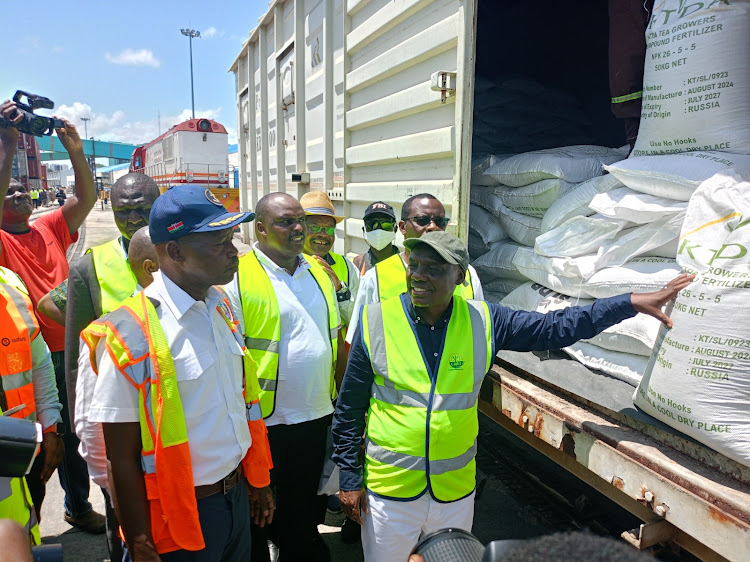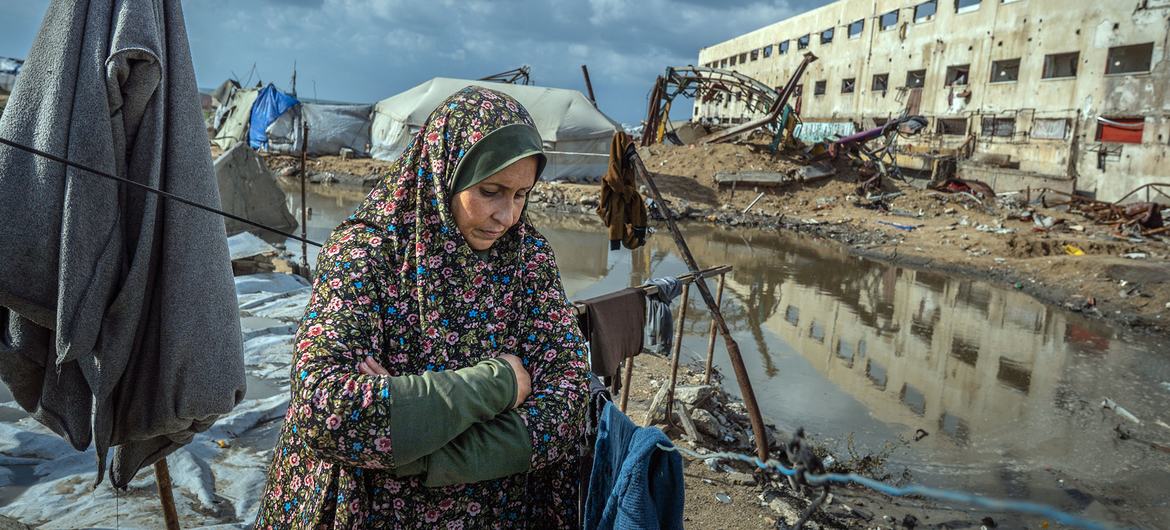Government releases first batch of fertiliser ahead of short rains

The fertiliser is the first batch of 97,000 tonnes procured by the Kenya Tea Development Agency to support farmers.
The Permanent Secretary (PS) for Agriculture Kiprono Ronoh has flagged off the first batch of 47,300 metric tonnes of NPK fertiliser ahead of the October-November-December rains.
The fertiliser is the first batch of 97,000 tonnes procured by the Kenya Tea Development Agency (KTDA) to support farmers.
More To Read
- CS Kagwe urges bold reforms in agriculture sector as Intergovernmental Agriculture Forum opens in Naivasha
- Kenya wants China to remove tariffs on coffee, tea, avocados as trade imbalance persists
- City Hall moves to recognise urban farmers in policy review
- Tea board to probe workers paid without farms in crackdown on fraudulent earnings
- CS Kagwe orders integrated pest management to save macadamia nuts
- Farmers accuse KTDA of favouring Eastern regions in bonuses
Some 680,000 smallholder tea farmers will benefit from the first batch of 47,300 tonnes.
The next consignment is expected to arrive at the Mombasa port in the next two weeks.
Ronoh, who spoke at the port on Wednesday, said the government is fulfilling its commitment to tea farmers through the fertiliser subsidy programme.
"As promised by this government, the cost of one bag of fertiliser remains Sh2,500. Tea farmers, like other farmers, will benefit from the subsidised programme which the government has put in place," he said.
Rono stressed the importance of the tea sector to the economy as it contributes close to four per cent of the country's GDP.
"In terms of money, it moved from Sh138 billion to an earning of close to Sh200 billion. It is attributed to good rains, government fertiliser subsidy programmes and an increase in tea bushes," he added.
The PS also encouraged tea farmers to step up their efforts as the government looks for a market for their tea to improve the livelihoods of farmers and the socioeconomic indicators of the country.
On the unsold stocks of tea, PS Ronoh lauded KTDA for its efforts in reducing the amount of unsold tea and promised that going forward, there would be no unsold tea above 40mkgs.
To address tea factories' operational efficiency, the government has commissioned an audit of all the factories to check on their challenges to enable it, together with KTDA, to support those facing inefficiencies.
"We also realised that the issues of quality also contributed to low tea earnings for some farmers. We are rolling out reforms in the tea sector and among them is to see how best we can improve tea quality," Ronoh said.
The PS assured farmers the government is keen to expand markets across the globe and that there were arrangements with China to buy Kenyan tea.
 Agriculture PS Ronoh flags off a consignment of subsidised fertiliser, procured by KTDA, at the port of Mombasa on September 18, 2024. (Photo: Handout)
Agriculture PS Ronoh flags off a consignment of subsidised fertiliser, procured by KTDA, at the port of Mombasa on September 18, 2024. (Photo: Handout)
He said the government is building a common user facility to assist small-scale tea farmers in value addition and packaging.
"A common user facility that was launched by the President recently is ongoing in Ketepa, Kericho. We are also going to look for a common user facility in Mombasa and Nairobi to take care of the Eastern region," Ronoh said.
Tea directors were urged to ensure there is proper governance in their factories to reduce wastage and theft of tea due to wrong calibration.
"We realised some machines have got challenges and sometimes they give wrong readings either by design or error. The Tea Board of Kenya is going to inspect all the tea factories weighing machines to make sure they are weighing the right weight so that there is no theft of tea farmers at tea buying centres," the PS said.
KTDA Chairman Enos Njeru commended the government for the fertiliser subsidy programme.
"There is that commitment by the government to pay the balance which will be close to almost Sh1,000. We appreciate this," Njeru said.
Njeru challenged tea farmers to concentrate on quality rather than quantity.
The KTDA chairman said farmers produced 1.4 million bags of green tea leaves this year as compared to 1.1 million bags produced last year.
President William Ruto earlier said the Mombasa port’s efficiency has led to the timely offloading of fertiliser from the delivery vessel.
He told KTDA that future consignments needed to be ordered on time because of the long routes ships have to take due to upheaval in the Red Sea.
Top Stories Today













































